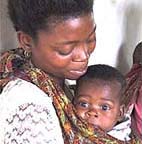|
||||

Credits and Copyright
|
|
|
|
Fifth GAVI Board Meeting, 21-22 June 2001, London, England June 2001 Alignment with accelerated disease control intitiatives Discussion The scope of work and insight captured in the paper was appreciated by the Board. The issue of reducing childhood mortality from measles, meningitis and other child killers is very important to African countries. Better integration of disease control initiatives within health systems is crucial; we missed some opportunities in the polio campaign to strengthen capacity for maintaining sustainable services. There are many positive lessons to learn from the polio eradication initiative concerning how to reach every child; it is encumbent upon us now to use those lessons to develop systematic outreach strategies in countries with difficult-to-reach populations. At this stage in the polio eradication efforts, countries will appreciate a clear statement from GAVI partners that they support eradication. Any efforts to better align immunization efforts must be designed so as not to disrupt or compromise the investments and ongoing efforts in polio eradication. Efforts to increase coordination between disease control initiatives will have an impact on the work of all GAVI entities – the Board, Working Group, Secretariat, and task forces. The Advocacy Task Force will need to urgently address issues raised by alignment. In order to ascertain how staff currently funded by the polio eradication initiative should be utilized in the future, it will be important to have an analysis of human resource capacity and shortfalls in countries, including financial implications. It is very important for GAVI to cooperate and collaborate with other immunization and health initiatives, but it is equally important for GAVI to maintain its sharp focus and efficient operations. A balance must be found. DECISIONS The Board:
*Current GAVI objective #2 is: "Expand the use of all existing safe and cost-effective vaccines."
|
|
|
Contact GAVI | Guestbook | Text version | Credits and Copyright |
|
